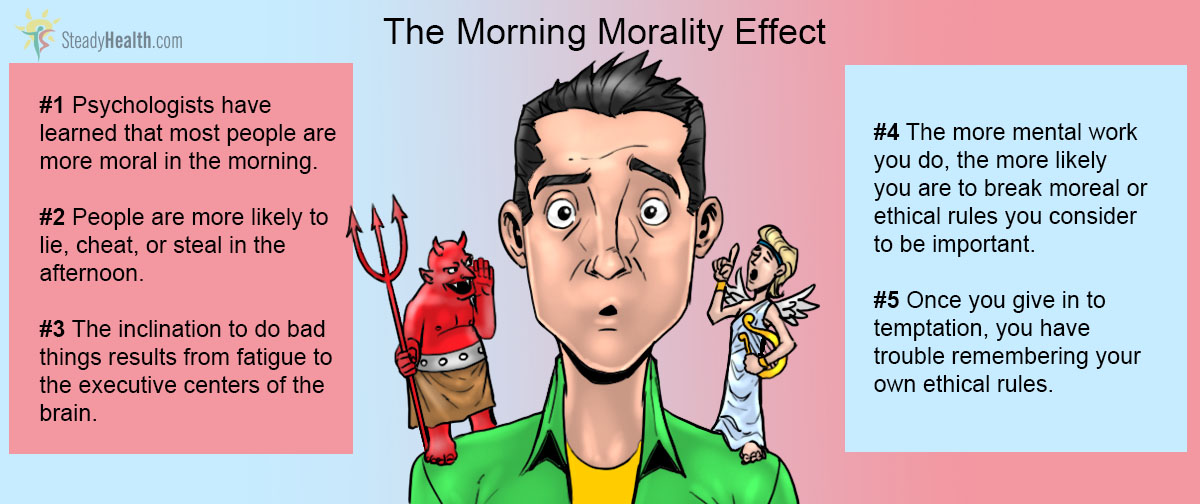Lots of us puzzle over the question of why good people do bad things. Maybe we really ought to be concerned with when. Research published in the journal Psychological Science in early 2014 found that people are more likely to lie, cheat, and steal, the longer they have been awake.
Four Experiments About Morality And Time of Day
Psychologists Maryam Kouchaki of the Edmond J. Safra Center for Ethics at Harvard University and Isaac H. Smith of the Department of Management at the University of Utah devised four experiments to probe the relationship between time of day and moral behavior.
In the first experiment, the undergraduate student volunteers looked at images of dots on a computer screen and reported whether the dots were more concentrated on the left side of the screen or on the right. If the participants in the study answered that the dots were more concentrated on the right side of the screen, they were rewarded with five cents, with an opportunity to accumulate up to $5.00. Answering that the dots were more concentrated on the right side even when they were actually more concentrated on the left was also rewarded with a nickel. Essentially, the researchers were paying for lies.
Does The Devil Sleep In 'Til Noon?
Some commentators note that the results of these experiments suggest (metaphorically, of course) that an angel sits on your shoulder in the morning and a demon sits on your shoulder in the afternoon. Kouchaki and Smith, however, have a more nuanced explanation of their results.
The two researchers believe that moral behavior requires a brain activity known as executive function. When that part of the brain is fatigued, it is less able to regulate moral behaviors, and actions that are inconsistent with personal standards of morality or ethical behavior are more likely.
What kinds of behaviors "make your brain tired" so that you are more likely to tell a white lie, or break a traffic rule, or take advantage of someone. Smith and Kouchaki say that something as simple as memorizing a list of numbers taxes the executive centers of the brain and increases the risk of "bad" behaviors. Choosing the clothes you want to wear, pouring over a long menu to order lunch, or taking a semester exam in nuclear physics could all strain the brain's ability to regulate moral behavior.
See Also: Two Great Habits That Sharpen Your Focus And Improve Memory
Even night owls, people who prefer to sleep during the day and do most of their activities at night, experience a similar effect. The longer they have been awake, no matter when they woke up, the research in general suggests, the more likely they are to break their moral codes.
Don't Waste Time On Decisions That Don't Matter
There are certain people for whom the morning morality effect has a particularly strong significance. Smith and Kouchaki have found that people who are "more moral" are also more likely to slip the longer they have been awake.

This finding really is not particularly hard to understand. Sticking to a stringent moral code takes brain power. The more decisions you have to make, the more your brain wants a time out, and the more likely the metaphorical demon is to sit on your metaphorical shoulder.
All of that is not implied by these four experiments, of course, but there is a significant body of psychological research that supports this idea.
What kinds of mental activity increase the likelihood of immoral or unethical behavior, and forgetting about it later?
- Facebook and other social media. Having to decide whether you "like" a post or a picture and phrasing comments that can be interpreted in multiple ways by your friends and the public drains mental energy.
- Video gaming. Games are great for increasing coordination and speed of response, but too much gaming is a brain drain that impedes moral, sensitive personal interactions.
- Smiling faces. People who exhibit a positive affect, who seem upbeat, happy, and energetic, are less likely to be processing moral decisions. When you smile your way through your day, you are somewhat more likely not to stick to your own moral code. Whether or not this a bad thing, however, depends on which rules you break, or not.
- Slipping the first time. Before you break a moral rule you consider to be important, your brain's executive function centers work to make sure you don't. Once you do break the rule, however, you tend to forget it and break it again. Selective forgetfulness reduces cognitive dissonance and helps you feel more comfortable emotionally.
So what can you do to keep from succumbing to temptation because you are fatigued?
- If you place your hand over your heart, you are more likely to be truthful, and others are more likely to believe you are truthful.
- Hang out with honest people. Our "gut" reactions, processes that are automatic, fast, and effortless. When we act on our gut, we are making a comparison between the current situation and a situation we have encountered before. The more you associate with other honest individuals, the more likely you are to remember situations in which honesty or ethical behavior is required by your personal morality.
- If you break rules to help someone else, for example, you tell a white lie about how someone looks, or you say you feel fine when you know the other person feels terrible, make a habit of taking a moment to evaluate what you get out of breaking your own moral code. Most of us are more likely to lie, cheat, or steal not just when it benefits someone else, but when it benefits another person and ourselves. This phenomenon is known as self-interested altruism.
See Also: 10 Ways to Stop Making Yourself Miserable
- Kouchaki M, Smith IH. The morning morality effect: the influence of time of day on unethical behavior. Psychol Sci. 2014 Jan. 25(1):95-102. doi: 10.1177/0956797613498099. Epub 2013 Oct 28. PMID: 24166855.
- Smith IH, Kouchaki M. Does the Morning Morality Effect Hold True Only for Morning People? Psychol Sci. 2014 Oct 6. pii: 0956797614552499. [Epub ahead of print] No abstract available. PMID: 2528766.
- Mind map by SteadyHealth.com
- Photo courtesy of Frankieleon



Your thoughts on this